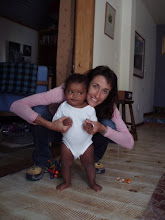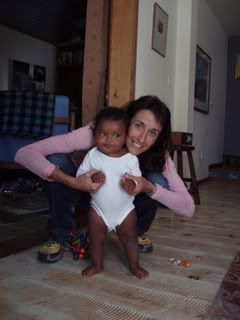Well, he might not have been dead, but in Africa, you have to be actively moving at all times or you don't have a chance; this is him less than 10 hours later. (Don't you love the fly on its back? Poetic.)

In Africa, every mouth is wide open to the sky, and everyone -- and everything -- is hungry. I did not realize this at first. I knew the cats were hungry, so we feed them sometimes. I knew the street boys were hungry, so we boil eggs and buy them bananas and try to make their days a little better here and there. But what I did not know was that even my maid is hungry, so that she does not eat lunch except for an occasional piece of bread, and that my guard and my gardener and most of the people of Senegal eat just one meal per day, because there is no money for more.
I thought the Senegalese were just thin people.
It was my friend Amber who told me, when I was complaining (yes, complaining) that my maid was kinda moody (I really do not like moody. Especially in the house with me all day.) And we started talking about all the things that could be wrong in her life, just how hard life IS here, and then Amber asked about how the maid was eating. I told her about the bread. I told her about how I thought it was odd that she didn't take time to eat lunch, and how I figured it was a cultural thing to skip lunch.
I am such a stupid stupidhead.
One day my maid was going shopping and I didn't feel like going out and I asked her if she'd hand the boiled eggs to the street boys, and she kind of looked at me funny and said okay. I said, "Do you mind? Is it okay?" "Yes, it's okay," she said. I wonder what she was thinking. She probably was not thinking, "Boy, that Lindy is sooooo nice."
Last week, our gardener punctured his foot with a pitchfork. The next day it was really swollen, and we sent him to the doctor, who cleaned the wound and ordered antibiotics. The prescription was for 20 pills, but when the gardener came back asking for money to fill it, he said, "I could just take three or four of the pills," so it wouldn't cost so much, and the naivete of that, plus his willingness to save us about $3, just about kills me. A bare-bones education, if any at all, just leaves room for learning Wolof and basic addition. There was no health class, no earth sciences. I started to wonder, does he even know that the world is round?
A friend asked her maid to cut the recipe in half for dinner. She couldn't do it, because she didn't know what one cup would be if you took just half of it.
It is hard to wrap your head around the contents of an uneducated mind. For probably 60% of the people of Senegal, absent are the baseline understandings and assumptions Westerners bring to every decision and conversation and thought that foams up out of our brains. For many Senegalese, there is little sense of the order of the world, or how our bodies work, or how the continents line up.
Which brings into question exactly what your responsibilities are as an employer. You consider whether you should hand the gardener an antibiotic each morning with a cup of water (which I did not do), or if you should provide your maid with lunch every day (which we do), or offer to send her to night school (which she declined) -- your ability to determine exactly what your responsibility is to people who know so much less than you is confused.
On the one hand, they are adults, I pay them money, they decide how to spend it and what to eat or not eat, and that's that. On the other hand, even though we pay our maid 30% more than most other people I know, she is still probably poorer and hungrier than most homeless people in America. Senegal faces skyrocketing food prices and large hotel and development projects that have forced local people into inland slums choked by dusty roads, open sewers and spotty water supplies. And 40% unemployment.
There are so many problems floating around in this disorganized post of mine: uneducation, unemployment, skyrocketing costs of living, hunger, infrastructure, scarcity, corruption.
The usual heartbreaking suspects.





3 comments:
that post really leaves me with a lot to think about. I can't imagine how you would start drawing the line between people you can assist and people you can't. After being in ethiopia last summer to pick up our daughter, I am so envious of the time you have in Senegal- but glad I get to read about your experiences.
Perhaps the most important contribution that you have to make, above and beyond concrete employment, is your effort to communicate about the daily realities of others lives with sympathy, compassion, respect, and good humor.
I have your blog on my blogroll at "Halfway To France" because I think that you life is its own best contribution. If it is like most lives, the experience you are offering yourselves could not be bought. It is priceless, in all its dimensions.
wonderful, responsible, honest post. bravo
Post a Comment